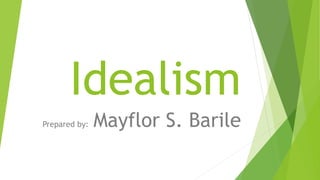Idealism is the oldest systematic philosophy in Western culture that believes ideas are the true reality. It began with Plato and holds that material things do not truly exist but are imaginary constructions of the mind. Idealism aims to discover and develop students' intellectual and moral abilities through a curriculum focused on literature, history, philosophy and religion. Teachers guide students to realize their potential through methods like Socratic dialogue, discussion, and helping students handle ideas.



























